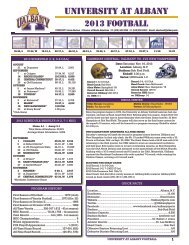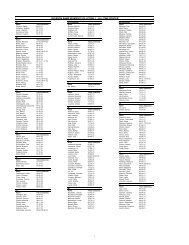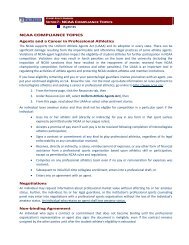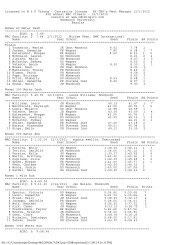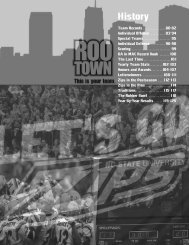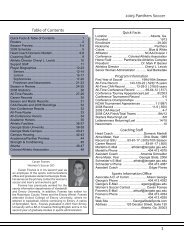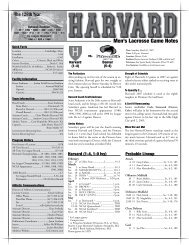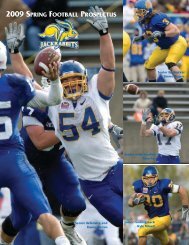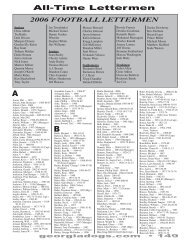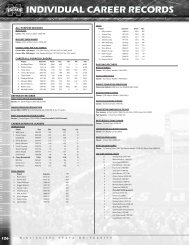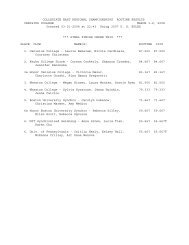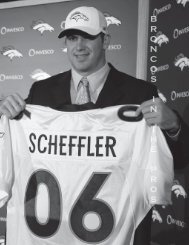Wrestling layout 04-05 - Home Page Content Goes Here
Wrestling layout 04-05 - Home Page Content Goes Here
Wrestling layout 04-05 - Home Page Content Goes Here
Create successful ePaper yourself
Turn your PDF publications into a flip-book with our unique Google optimized e-Paper software.
THE HISTORY OF HOFSTRA WRESTLING<br />
The history of Hofstra <strong>Wrestling</strong> dates<br />
back almost 60 years. The program,<br />
which began as a club team in 1945,<br />
grew quickly and became nationally recognized<br />
within two decades.<br />
The first season of Hofstra <strong>Wrestling</strong> saw<br />
Walter “Brick” Stone as the team’s head coach.<br />
In its first season as a club team, Hofstra went<br />
undefeated in six matches. <strong>Home</strong> matches were<br />
held at Hempstead High School. Three<br />
members who helped initiate the first team<br />
were Dick Bemson, Frank Fusco and Jim<br />
Geiger.<br />
<strong>Wrestling</strong> became a varsity sport during the<br />
1947-48 season. That year Hofstra entered the<br />
NCAA Championships held at Lehigh University<br />
after compiling a 5-2-1 record.<br />
Under Stone’s direction, the wrestlers set a<br />
school record of 16 straight victories during the<br />
early ‘50s. The 1951-52 squad suffered only<br />
two losses en route to a 10-2 season. One of<br />
the early program’s outstanding wrestlers was<br />
Art Strunk.<br />
The next Hofstra wrestlers to enter the national<br />
spotlight were Dan Notine and Pete Damone. In<br />
1956 Notine became the first Hofstra wrestler<br />
to capture a coveted Middle Atlantic Conference<br />
Championship. Damone replaced Stone as the<br />
team’s coach in 1960.<br />
The early tradition of success continued during<br />
Damone’s six-year reign as head coach.<br />
Damone produced several fine wrestlers,<br />
including Don Hannon (‘60), Tom Haseman<br />
(‘61), Dick Snyder (‘63) and Ken Robinson<br />
(‘64). The 1965-66 squad won the Metropolitan<br />
Intercollegiate Championship and crowned its<br />
first Metro title winner, Art Rudolph.<br />
In 1966 Bob Getchell became the program’s<br />
third coach. Getchell’s first squad produced two<br />
Metro Conference winners, Butch Jemmott and<br />
Ken Robinson. His second team won the Metro<br />
title with Jemmott, Dave Berman and Marty<br />
Willigan all taking individual titles, and<br />
wrestlers such as Steve Molello offering great<br />
contributions to the team. Willigan was named<br />
the 1968 Tournament’s Outstanding Wrestler.<br />
He then went on to the NCAA Championships<br />
where he took fourth place, becoming Hofstra’s<br />
first All-American.<br />
In 1969 the team finished third in the<br />
Metropolitan and Middle Atlantic Conference<br />
Championships. Willigan captured second place<br />
in the NCAA Championships, losing in the final<br />
round to Iowa State’s legendary Dan Gable, the<br />
top wrestler in the United States. Gable would<br />
later coach Hofstra’s current head coach, Tom<br />
Ryan, while he attended Iowa.<br />
The wrestling program continued to develop<br />
under Getchell’s direction. Joel Kislin became<br />
Hofstra’s second All-American when he placed<br />
third at the NCAA Championships in 1973. In<br />
1972-73, Hofstra hosted the Middle Atlantic<br />
Conference Championships and placed second.<br />
In the mid-1970s, standouts Nick Gallo, a 126pounder,<br />
and Don Mayorga, a heavyweight,<br />
began to make their presence felt. They<br />
powered Hofstra to three East Coast Conference<br />
Championships. (The Middle Atlantic<br />
Conference formed the East Coast Conference<br />
during this time.) Gallo went on to become an<br />
alternate for the United States team in the 1976<br />
Olympic Games. In 1977 he captured the NCAA<br />
Championship at 126 pounds. He also earned<br />
the Tournament’s Outstanding Wrestler Award.<br />
Bob Getchell then left the coaching ranks to<br />
become Hofstra’s Director of Athletics. Al<br />
Bevilacqua replaced him and continued the<br />
winning tradition. Hofstra won six straight ECC<br />
Championships from 1975 through 1980. After<br />
missing a year at the top in 1981, Hofstra<br />
captured two more titles in 1982 and 1983.<br />
Hofstra standout Nick Gallo returned to his<br />
alma mater in 1979 to direct the program. In<br />
his four years at Hofstra, the team posted a 48-<br />
16 record and captured three ECC<br />
championships. As head coach, Gallo sent 11<br />
wrestlers to the NCAA Championships. Among<br />
these 11, Ed Pidgeon, a 1981 All-American,<br />
finished fourth nationally while Peter Capone, a<br />
two-time All-American, finished seventh and<br />
second at the NCAAs.<br />
Joe Bavaro took over the reigns as head coach<br />
from 1983 through 1987, posting a 23-36<br />
record, and leading the Dutchmen to another<br />
ECC Championship in 1983. Under Bavaro’s<br />
leadership, Capone, a 167-pounder, was named<br />
the ECC Tournament’s Outstanding Wrestler.<br />
Mike Arena, a 150-pounder and three-time<br />
conference champion, was also named the ECC<br />
Tournament’s Outstanding Wrestler under<br />
Bavaro.<br />
HOFSTRA PRIDE WRESTLING<br />
WRESTLING<br />
53



